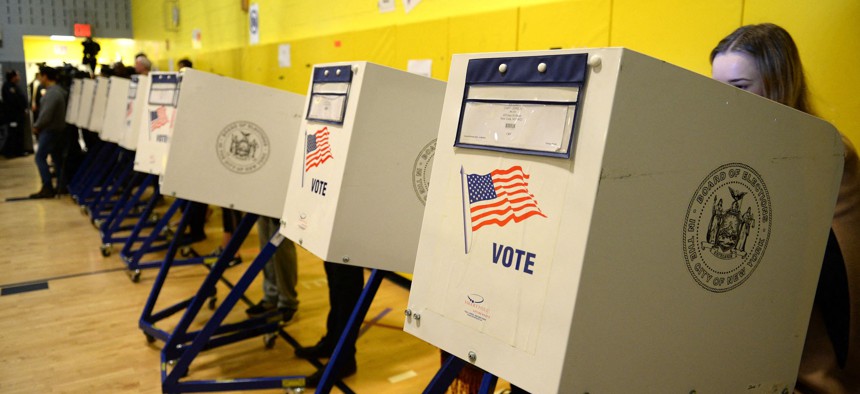States are banning private funding of elections. Some worry about unintended consequences.

People vote at a polling station in a school gymnasium in New York. ROBYN BECK/AFP via Getty Images
Wisconsin voters approved a ballot measure banning such cash infusions earlier this month. Proponents of the bans say they limit interference in elections, but opponents say chronically underfunded elections offices need help.
Wisconsin became the latest state to ban using private funds for election administration earlier this month, part of an ongoing trend that has swept the nation in the wake of the 2020 election and the COVID-19 pandemic.
Voters in the Badger State approved two Republican-initiated ballot measures to amend the state constitution: one to ban private donations to elections offices, and another to limit who can perform election-related duties. The former measure took 54% of the vote, while the latter won 58%.
According to the National Conference of State Legislatures, Wisconsin is now one of 28 states to ban private funding of elections, with all those bans coming in the last three years. Wisconsin’s effort is notable as it is the first prohibition to be approved by ballot measure.
The issue largely stems from grants the nonprofit Center for Tech and Civic Life, which gets a chunk of its funding from Facebook co-founder Mark Zuckerberg and his wife Priscilla Chan, awarded to election offices in 49 states.
In 2020, the group gave out between $5,000 and $19 million to help ease the unexpected expenses associated with running elections during the pandemic. According to a public disclosure form filed with the Internal Revenue Service, CTCL distributed more than $300 million in grants during that time.
Those extra expenses included producing and processing more absentee ballots, providing larger voting facilities to allow for social distancing, performing more cleanings and buying more hygiene supplies. But the donations alarmed a lot of people, particularly Republicans who derided the donations as “Zuckerbucks” designed to help Democrats. Others are worried more generally that the donations open the door to possible election interference..
“Those who support banning or limiting such grants argue that private funds could result in the donor or grant-making organization having undue influence over elections and perhaps favoring some jurisdictions over others,” NCSL wrote. “Opponents, however, say that elections are chronically underfunded and that such bans may prohibit election offices from using donated resources such as cybersecurity tools and the use of polling places they have long relied on.”
Defending the grants, CTCL said they were awarded to election offices in Republican, Democratic and swing jurisdictions, and were necessary given the chronic underfunding of elections offices across the country. A study from the Massachusetts Institute of Technology found that election services ranks among the least funded sectors of government.
Tiana Epps-Johnson, the group’s executive director, said in a previous interview with Route Fifty that policymakers do not appreciate how strapped election offices are for cash, which means they struggle to do basic maintenance, comply with laws like the Americans with Disabilities Act or upgrade their equipment.
“This is the reality on the ground that election departments are working through,” she said at the time. “And I think it's really underappreciated, the texture of how bad it is.”
In its summary of legislation banning private funding, NCSL notes that the specifics of each law varies, with some elections officials explicitly banned from accepting philanthropic funds and others more closely regulated as to when those funds can be accepted.
Following news of the ballot measures’ results in Wisconsin, U.S. Rep. Jim Jordan appeared alongside Wisconsin Congressman Bryan Steil to urge voters to “keep dark money out of our elections,” adding that “Zuckerbucks sow distrust” in the state’s elections. Steil continued, “Elections are partisan, but election administration should never be partisan.”
Steil used the moment to tout his American Confidence in Elections Act, which would ban private investment in election administration nationwide and advanced in committee in February. Wisconsin Democrats, meanwhile, criticized Steil for appearing alongside Jordan, who has repeatedly attempted to overturn the results of the 2020 presidential election.
Other states saw similar rhetoric in favor of the bans. Members of the Kentucky Legislature alleged the grants were spent on “electioneering” rather than COVID-19 ahead of that state’s 2022 ban, and said they were spent more to help Democratic candidates than Republicans. Meanwhile, Florida Gov. Ron DeSantis signed a ban as part of what he called a wider push to strengthen the state’s “election integrity.”
Some observers, including the libertarian think tank Cato, remain skeptical about whether the CTCL grants made any difference in the 2020 election.
Meanwhile, supporters of using private funds to help fund election administration remain concerned about election funding and warn of dire financial straits. Ahead of the vote, the Wisconsin chapter of the American Civil Liberties Union argued that the state’s local elections offices run on “shoestring budgets,” and that philanthropic grants have “provided a lifeline” to pay for equipment, polling places, workers and other supplies.
Leaders have also warned of unintended consequences from such bans. Amid a growing shortage of physical polling places, Election Assistance Commission Chair Ben Hovland previously told Route Fifty that banning philanthropic donations could prevent churches or businesses from making spaces available as voting locations.
The ACLU made a similar argument, given what it termed the “vague” language of the constitutional amendments.
“As written,” the group wrote, “it could prevent election officials from using polling places in non-public buildings or even using tables, chairs, electrical outlets, or any other equipment or facilities present at polling places that are privately owned, such as churches, private school buildings, community centers, or other privately owned locations.”






